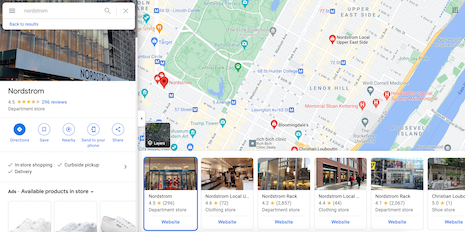As the hybrid, omnichannel customer journey becomes mainstream, post-pandemic shoppers are expecting more convenience from retailers.
According to “The New Face of Local” report from Uberall and MomentFeed, the presence and accessibility of physical stores remains an important shopping consideration even amid the growth of ecommerce. Bricks-and-mortar locations also play an essential role in retailers’ ability to offer convenient services.
“Retailers and brands must recognize the importance of integrating stores and ecommerce – put local inventory online, allow BOPIS or curbside pickup, where appropriate,” said Greg Sterling, vice president of market insights at Uberall, San Francisco.
“People tend to think of stores and ecommerce as mutually exclusive,” he said. “Our data shows the opposite is true.”
The findings are based on a survey of more than 1,000 U.S. consumers and an analysis of the online performance of nearly 80,000 business locations.
Rethinking local
The onset of the COVID-19 pandemic forced businesses to digitize their services and gave consumers more ways to engage with brands, leading to 11 percent growth in consumer engagement with local businesses from 2019 to 2020.
Three-quarters of consumers plan to continue shopping locally after the pandemic, and plan to use digital services such as buy-online-pickup-in-store (BOPIS) for added convenience.
 Neiman Marcus was one of a number of retailers to introduce contactless curbside pickup during the pandemic. Image credit: Neiman Marcus
Neiman Marcus was one of a number of retailers to introduce contactless curbside pickup during the pandemic. Image credit: Neiman Marcus
This illustrates how consumers still find offline, bricks-and-mortar offerings to be valuable even as they gravitate towards ecommerce.
Seventy-four of U.S. consumers have indicated an omnichannel shopping preference that includes physical stores, whether they are researching online and buying in-store, using BOPIS options or buying items they come across while shopping at a bricks-and-mortar location.
Meanwhile, less than 18 percent are beginning and ending their customer journeys online. Additionally, two-thirds of shoppers are more likely to purchase something online if they can complete potential returns in-store.
“Even though the store wouldn’t get credit for such purchases, the presence of the store was instrumental in the consumer’s mind,” Mr. Sterling said.
The pandemic has also accelerated consumer engagement with local businesses, but this does not exclusively mean small businesses.
“Sixty-six percent of respondents considered national chains and brands with stores to be ‘local businesses,’” Mr. Sterling said. “This is not typically how brands think of themselves.”
 Brands and retailers should ensure individual local listings are updated. Image credit: Google Maps
Brands and retailers should ensure individual local listings are updated. Image credit: Google Maps
This is why retailers should ensure online information for individual physical locations is accurate and up to date.
Worldwide, shoppers performed 8 percent more online local searches in 2020 than 2019, turning to sites including Google, Apples Maps, Yelp and Yahoo. Monthly actions on global retail listings increased 18 percent in 2020, with growth in phone calls and website clicks outpacing the decline in clicks for driving directions.
Bringing in shoppers
Ultimately, a strong digital presence is vital for brands and retailers with multiple locations.
According to a 2018 Uberall report, more than 80 percent of consumers are using their mobile phones to search for retailers, products and more that are near them at the moment. Leveraging the keywords “near me” and gaining visibility in these localized searches is a key way to get consumers in the door.
Showing the importance of mobile to bricks-and-mortar retail, more than half of those who use their phones for shopping seek out store hours or locations (see story).
Another Uberall study showed that 19 percent of respondents admitted to always checking platforms such as Google or Yelp for store reviews when deciding where to shop. A majority of consumers also believe brands should reply to every review posted about a store (see story).
“Consumers are going to shop differently at different times based on convenience and safety,” said Uberall’s Mr. Sterling. “Retailers need to make it easier and more convenient, especially for luxury buyers, and enable them to do business with luxury retailers in multiple ways according to what best suits the needs of the consumer in the moment.”
{"ct":"oJIxeidVylBUv\/iEiItoDIFcw+TiGGfZeTRl1b6+xxUT0rm05KPXPYu6WR4ENuWJovGUZOqTV4G\/mSTxt7uVCo8fs+HethaDCxNQsY1VzzB27o5fzxUAo8Tko\/YDMl3XaNzVzrWxxB1FBgJs9DHaX7SOkW\/R9vK6tUMdg5cD5tsy52DdF6DYbFX+sGy9lsLDMOfeG9hOq9hwO4lB3+UwWzQlLbp06WTLG2Ha9D6QKQu5BlQWFNHJDIdqDbJmwQQxZeqDZh02ix+e\/BQthFKQF5vxf\/Ytcev9UNll3xWikvFu6TDpJj3KVM3tx84KGBoQJGT\/TwwQyntqH\/4IYlGUoAKwvtBPG6oaXvzpd4s89eOPOJE4c0HuVpMHMl3Ri+qm658QXAnjYP3mqIw\/KOUANfXv\/EBNob8aeHjNcUJsIvAq9CTmLnEuGPErvnRkzx41OBj3Fg34mztA0Ks4IcudO6jZo9cxcRSYeR4OOgTLYxTZq9TTv85I2LZdpnYcK+YisF+I5nfk6MS+dUmHqHBGYfpfqBIXw21oCtMD1o\/VdX1zLl25buc1eYL7Lz7BYC9tGnh5uw0Ryu0m4amGKh5AVn7D5MB4nLuQ1QxcB3diDIZ0SCmTKD\/SRRmjqLgv1Ju36evL5RBUPxI5WbsVNmsiKgXvV2nM+fdiHi3KT2xr7Apop+zD\/uuH35X+APzcgHCrW1X+qqFR9ddCI5iBNBcqg6KJhkcAA3jRN0E42d4Epnd3Fu4LoJTk4sj+Wwj843AkNLSE3VeGSzG291CzDna0gisuOKvtLB0Kldw9Sm66Usul74B1R6QqkRPwnOnW68AJnWtiKF2s3zfasNmeYweEhga58uDjU11LKIpsWDM9\/stAzme9ihjP85T\/3GQgka7Uus54hS8ErFc5uTmvczF6dlrcgGezV2kjhlC22POu\/0\/OADvbq129tRY0fXelXnA7bKlE\/PXS4+CyrjKMt8mK0H3FkyOM3Vuu3kq4k705QQkw1tmNC8EBk91o9XLySWsIowMyhMTCxvFTRsl8JFJsuW+2P3Y0ujLWk+eJL8NQf0Jw+NxoWTyVaU3Xn2m8mxlJ3l3G0hn0dgvw1olJulf3SoGvTXeGrqdhM2KLMZ1Qswr\/Ou2jIPS9CR4kVyiu2SxzIF1kSuDlV0Hm4fzwCUJU5NrNSQFqulHBDbfw0Qx6yRSxCj+jTZPJeYhzT0H80dYiOtRU3eDDqNgn1k\/VpBeZUM8bjpQ+vg32IH2wqANxmFQCejH9UjhjllKrCy+CNYhh0lkijUeSuIT7ed448H7Fh9GM1e2s54UB\/DuKGOdYacSYllIe7+n5jPffwnvSVmCcgecU3mlWqGue9m2nt3yvzvL4maA33kGPD4JAyZ9IUp9jAUEloFaGROYRY7zqfcyOchyuxEGNIQCD0\/zWKO3yjtkcLvyxYKo70jO6g+0LXlM86ftwgeUFeVb8i4jFxqSqFo49jptkcN0TmEDZ0paJ04GJpd2e+e1I3dKYeldksfvO94W6ULZ6caeq4mvfGUJqMIuRiirmyZBOu8+uzRYu2jDW\/0GGs36dEkjxytUlv6yJdFRyx3+5ZjgBdLM6dKcL2ZHGBotN8OygEPWmRR0M7JRBNNelO02Pk+VuBio1sLa5oSRlS2qH71BQeclG\/y5s1ILaDHqmxRP6LftFZGXe+sBIiz0VqClaRb4nl2uCWPPVDaTivDggvxPL\/spoPYQSwlepOLcJsWThw0\/ziafJrXMCaKTjTRr9UBNg\/tANkNQh8g+ds+2dPhv0It\/X5\/onTILmlE0rYV8EgdppM0xsohHC+Im\/Ps9NW9BcEMfT9kiRHFp8bgG6pkzNG+2ZncEjF3BTbVeEqnDEwUZYz\/lHqh+0bYZSf0Rbi0qy1XIwdi33uEhWRlFVZer08JVJ0pNbzrZZXFluNuXnKUG7MS9fCq3vvm9mGjyQ6Y6hFJjrviXW1pH8DhFftawT0YpQf08lncXN053EJh32DCsklzJzeYHU1zxP0XADSISNZd3wy1TFn4hAfg5NgO2D3imauffyHXQd7nX\/5v88X38+wU7pBC6kwtFlhvSxLiRddXYrn7lx5cOINN1YE4nQsgYMBaIO\/xK5q6G+8aSQUOsiZmL6ZSUeFZjxK3+Vedme2rIVYKCtChaNGBxjqrlyF8UPfBPLwQMQy7uwguWL6mT\/TdhHHP12Bx0sWU6NPUoATtcnffW4ZU6wA83Ctz91CX5mwQ9o5kKm6L0wIBx56TtbmbI7JF8284G9NnB77UiErqQeO39iGyB0EhaTY+m86MUNA8a2eQFfkLw0GJi0quQ2w4A\/97C9Y+hqB9MnWGUYodgk8BA5S2LkLZ\/CjrNeSFAnyQ6wuB5WANzG1y3V1Fglsi\/LQVzipue7kgYkHLFqGZgMfZsnCzIyKAas0XTw7qjtc7hSB20JR0TDdHZ6arF6XbVYGywiF4x\/pV9sum0Hpkvh7VPFIukC+5ygmsv3jQ7T1QRIUWAgqjSJTb3O36iR+514t7C+jW7b4YMNXNMfXTxYJACl4tY+5WdyyDRWxMzHA2Nw40lUPQ9agnRyURin4J+KSRI5hFbKLKBQwHVvxDM1JKhVn+YqhmTHzEF2OYkLcuLglNrEPnDgGD6dK9ao3tAFN\/JzbmchANelQZl8WogQrFZoCq4ANh4LGsGDhiOAAVXfx6a6uo60Lbi44RzMQml7If+tqrIBA1BYrYmQ5Q61aX3G+1ndlBqEjp4sN8xf0R7IPSQ8KjV9KmHOCJQqpH4Bne3i25T\/\/GeSkLP8cVGaH\/hoM\/SWUe4bBp7BTVVeZtIvpeUsBTTjynSpfNpamn+MIm5zFlJjvvoogmIiS1MDQGEHYKH6pjPVU9VIxQflnROXDrGn2y5es5SXkQ9IaYfwNxEvO4r2yPX\/xyru0ICscj8vyp+KAvZY1\/3K3f\/rY8aykiK\/41oFHSH6CIYs\/LLjerRPwM7rIeO+z4gDZCpT+rv\/QMP0361VXJk3\/1CfuoKtfHhKZ84yxo2eLWjnmwdZIqU9iy8kcW+gxiqrJLVM0E7g2i9bdvWD4NgcOir\/+8szPTYEQ55BYvquigf3aL95QlVMjXxSZd+yEL0wOz8rSWxHNmj1ThOI+BFQg5UiDSEV0vE1sMa9iG2ngqLOmJi0aPiN+MuSXvlG4o0Vq\/KUjWJcrImniPngXdJxwrBRjn4eLPuDotzIg5oYkA8atBJa+yXRVhL43FFZWiIjDAqA1aSgDO\/istAVV+s3jVEvV36WYPxvgZqHBLwIKFgkojWYpwp9Ae0x6A1XEo91Ws23GXnjarxrrMTx8pKXj6Yy34dKpJ8sAWUWTwxqd4C7R8\/DjyzkBrK5hbM34juW0Zkq6Nql3mUfAgKzxR\/JSB5UhJbdIjP0\/jJD\/\/w6hwBrpecSXnT1pgqoi9uhAQLwK+29xuOjwQDURDLpplBcRNmKduE41J0FiGT1seeWGSbTKA\/3gtZv60xixfjaB0K06suKySpXwEgGr15E6Run6rQMIPkZG7\/6j9p0a1ntKLjJIEKLWyQg8mEze5h7tHBQZvIE6Ealy\/EkdjHe36TtFYBzWQ0vkCiAJpytaCm66kvlyx7KMkV0NKF9kkxL6u8kVmDUkzvj3EgGMkLDuckHYe0v3b+dVfZVqMh53o9l1scSlsWAqM9zIppvcyhfP6QrOZ6QfziHZG9zlDzflSFnGNt2nuoTh5DsgqT5TkUF42eT\/urcKpOqYqORnPKotXmYEnslgJPKGRZ8bOPM2z6+HYZ1UE7z5SaFkr1NGDyH9QIJB\/q3E+H+YGZiPhO6zA3rSvYOVzfhlVcPoQEo\/dNqEKlCtxAa92HHKEIlLgoC4gJxlWgODkCkgtNTAReHVoUIy7hJLnXIo\/\/j\/v+M6swYHW6H5\/zzbqYqt7l0oM6sgdeiGWHQVnr1xuio6\/34xre08v2fJCgV4AKbwP+\/IL4dhUkUhr4lEtqny+AVJHadgkcEiBsoT0OXYURuEYu0UZhVN0bHxEYTjhSOYa3cnZveVzYfbDFJre3TEx4XrtzHe\/lwHpt63lYEkQvbgmCA0EqnPjXlhBAkD3mUGnbKQkzkd5L0ljWFZWiUdJAjmcSHrSWz8y\/TIXmV5rTrPZAjadnfhLB9d4WJB4FTB+\/5ZT8+LBUaUsCGk3HX7Gb9DHeow9tDuwY\/HbmQwyt8Fm7W\/P7pPskZfCS1nrtH\/orymr26AMIIQQnxD\/bjveN9N8y4mW\/SRThKJ0dIgHgYSytIlRj7prpGw3R+UDftZHYGaj+++EOrwXsK0EGy1EPUOA+oFVKf7YHZ90qv2WENWHPhR+l+L7m1+RmgDy9fSU4iDJFjeTcP8tM2fwEBdPYyVk0vIp2wKb2b31OC630zK3ahyNzp0A51pPoHec4kHisqmMaxYSmzzIFQkiyTImtar51fD2Oh8Ym7mxt8PQ3PzTHwsdQVATg2S2egRfNBkQMO1gQUoAMFZkxxQk51ozqWkkdhvJ3wHee5CUCX+A5395Anij5MHHIBlJ4583VEOetor\/9O30BK1mmTf+c9fVXHkbvwv\/06A0IyuQdRBFjWgC1ATm7gF9xR4paZn8AMpnECchvA6i9o7lGYvaBWJ9PAy2tgeSLKCflWhOzHBTNoN1dvnPznUO4tL3zw238\/bygsokodlKKqnlUG8PyOX9FWo4jrvh7TdrCCw35xBQe+9FhUBhr4YK65PXfPa94hGU18k5jpHqVSAc9GVwDC3onk5KjGMfqGqAaLBuTCzThBukC48ZdGoqLMeulcRR5ySY7uxBxoQX\/oRvfUbHaVAbsMDsqs6Up+1n4oy3UfQ5FH18k1NXHUd3FUbxOYuu0DzqPrcOt48GMi9l0YJtk+Ax5400LKiHRRV\/2lBmIdVKR329Am9hXrHMaxaMxJtZwIE4k4ei300jNiSbX5ZWazfoVOOvRtgDQNIwYZ9UDOK6kUE2ztpPsVNw1NUWFdIGJekiO8G2iwSNx5vsizp\/yivD+zohvaFqylwPo4XU4I3eKSz6E2VfXf60IdOaizpBNukrffFuH+W2krLvLR0ayj5LaigO4uKPXnm\/bHWPN7rTEjutXfxOfcCgX379XXejv3Eh7iaRgpXfkfAtA+F0f1MsDOou2b3YBI\/KeWDAuDRixj3ST6eEHNE\/pxWbyQCH6IByElQeCleiGwENbSz8p+ev33GOHDKcqUTdqYCulV8JPYtlk+zH2mkF+9jLay\/0Z7DxhiMEPey1kWu1SRa5GKhrNXj9UpKt5OShuAuUd3mJIX4uHETgSTRu7LskLqEyZ7aAbvCZFsMKFzKs41KrYNt4sns40GkYpkI0DY5Nb+X2mIuY4mJIKN55mssqpzm3\/qUAh0ygG0flNyDVvdGBjjTNPFiJi9LhVB8DulOOPbs4H56d3Zvs1aT\/79DzFo0+OLNibwhJ8vAuDoxkmBN2wJ6lmt1UdAyninzDPfG5wRxMbXp6cOeBdJv8w3XdvNJW5uIXurf7Ku1wWAXyyVjfGwOZ0JkqbYmtWan1IMBc+kOYUymbRAgOrLi9YziwDIdoIaAwzpyyb\/WUmiYJJ0e9ZqaFe1uDa2Dw1eyeOfTvdRLWDWFOIxav7VNP23FzL\/M1omw48Y+P\/tzK9m3F2wU+5L1B17jtUE\/uid\/Z\/s9qkAtcZP5SdlMxBE6j+rz4Hg7S8tcLJkhtxCAOqbsoL3GBk6aS1JJjIjdVND39uzRk7fUVERMfUWQdlyrUFkXAsQumZZGr76JnLAC7rNEkzp9bnbPNWiZv8zGB18EErilYEzM9d0pjiC7\/R9DvXp2ETE+ALMpJpRdIRhu+QOazNgnzaBiPdSC9bkaMXMdbzL\/xM\/eikxKGTZO9ipwB+VLvooJAqpkgTqV\/fd0w1lhyZYer7UD\/U+8R2RTS96fPOfjLutgjYxCWc7Q6bT+BzFQctW0bGrZc+AIUSxrHX15L\/Uw57cUXnxRkhJNBWzM9gkm1HVH9oKV2qnNff\/daz0UaPEfYp+G2V5hfQmZ9ETP58z4KEeoFNEsB8uc0tQWG7gRb4Qo+RjkT1xwDa6NZU5JfPIfxpzk+U3FOZ1j3ekSfdz2JMk6iEhC32pG+F5Do09m5o8fSxQoj2HFWZi4hX7lhTKQuSG6z\/MtewuIwI50sgs6o79G\/ETmUWycuWfZ3F6OI\/+OxEVrP9+wBtis+sjorIJVxYu8fQQGhDDxHUOlfqtKNZpOm7YPxA8Y1M1khc4LtT4ZuS+WuTK6JeWbCU\/Fy8LQqxqq\/3iQIut7d8cdomN8l2ZFj2qgH8aidsY7UdGxFUJZmUnmShDycu18jmUJyIBpbPWevuvF5gut4oVy3VjrUypM0qtlc31OyunzgUedgBGeNw7Y44HtL0mkmqrepaOaa5q+m8vsZmlaR2ncYlCbk3VCNqvVq6OFIuWfBG7m0MMnCl\/Uxzg5n\/IzMoLRvqAyUXy8kCeku6NmgkYWoOA6QaISn9jPPuDHZOlPPmXgA6gFdsfU4VvUyo8OH2xZKoojvgk+8aNXFhs+TfeWepw9dt3HcUOBlm6JjKf0l6mWbotTY4ziWHM4k72OI1I52uvyD\/vGwn\/Hk1vsnK3Z4iqQbdbGMDAaImKNhG+sL7ljsSJYpkALhch\/r+yJPYXu4xhjJ2fiBSYD2i07f4UWGK41RH2mgZHZhfGkzgWk3xDQHuY3QSYBkn5pmybKfkB17N0l9Ep0h8hW2VxpTDbZ8sYdYUhcma3JFv0gFjQmpqR5ZfpVTOBsmP1fKdr51Bo1OY4ab4aaSwfhQpp+cZgVT5WgNOG8I6W6aa+NREmbmcyINodTrMNGj+WjaHRn4SUlPvwejiaDimGGwTzX\/l0cqAH4+GEiZzA\/4DwJELhS4voqz\/Y7M4BAPHPjSIa6ggQNokv2mGE305diGnPpCeAXqf1bzEbIVlHEh095Z2GOWxfUHwobu0\/jY3OtNSBwUGFCVv5ttWRz4LfW0fcQW4\/+QHxrI\/KiY2KwyCSqp\/LKaTPdud7i7p0UlR9DrBf7TPTcJAaXGOBR+t99KpMaDDfdEL6XUqRFk89ndVqfbHphN9LNjxF99HZ\/vvOsVOCO73rnJW375JS0s7LfxnKjywyWzuuIXaO+gYec4wNhxMfFJ97kaIJF0OhS2heF8icIxI7leIA795cjTfMqy0Gi0m7e1PrE\/UNS2nixwp\/LwCakk6tLAYl7HtyAFo2JdcxmoW1yMM+Pi9Yfsxf4LWPaA8UG\/H8sO2FKu9oq0yKuiciWk5oeKhjEabsFZe46dAO9lBXlyBfXLol2CFahUQKWJh\/NrW2HoTzG17fG2VR8\/Y5oPjTPfoiUu\/ndD8\/dR6rduiB8kwJKytzpQiuNMKHF0JiqBQ68Pfq5+kmCtuVO9Mhk+HoU3sN6mCduxK5Uk10XFzBVqwThVz2PgaIFdJQM8k5z\/gQjWthAgGoQ23w6DdLWlHpcR2+6osLsFySjTT5ydv7\/Y4ccMSmG6jig32\/SVPHDQmiurPNNHgC2E4zc\/4gCBzAP2W2LAbpihbK649xeKFU58gZclnHQGMdfrJaGH0mXNAzT1u+ojM5SQBjwHzNB1Rdj\/cqUwxW1F9K8iaANIiIMTgyRDI6oY+onCee6Aex9OXvorHQtITLSa85Cmhfo\/k3uifoYucihXjl2iov2shvPd\/7ZlFx2e05wk2GORtMYyj97W6TX5zA0SdvWBEwttYwfH\/qVYJ3ADOY4LNs3QNTALMRxec1Txh7Uk44INChKzOTUlc\/PgD8KLVUSFqvNEO2lZoXbmXXmqeVVkaDY6IfyjJjaL2bOPizqEbBNbRy3By04l14KstFQrXIqlnHb9Kri9OYbwYJi8L23hh54o3Lc\/8GZvNu58bfXfFVLlcRpBSA7J2y1KLFng5X4f\/noN+3J24YGf9r3U53Ec2jAL\/NG3TGyRVVV+LtVRjNfHbuC2X+22W7anvnD9Y4lMq72hzPo1rvd74dEQUHXuuwMbpKYbez3kXUhYAXRbwvVy2TJ8CDNYVDtO8NYSMsKYVb3NqY\/C9kf5B2iomvk4mTORD2FInsZVhlXyGN0qUR8\/YTBtuVf8Gj8zk6JJB1QoyKpSKr5iKSPX3sJzH0CSokcUNBLh4IcCvcwG5rRt5zViPT7603ew3ds3LvuVTSsWzOVRgTaA==","iv":"53939db8cd8859efa5bc97ad0b64027f","s":"8e0ae4d2c18dae41"}

 Neiman Marcus was one of a number of retailers to introduce contactless curbside pickup during the pandemic. Image credit: Neiman Marcus
Neiman Marcus was one of a number of retailers to introduce contactless curbside pickup during the pandemic. Image credit: Neiman Marcus Brands and retailers should ensure individual local listings are updated. Image credit: Google Maps
Brands and retailers should ensure individual local listings are updated. Image credit: Google Maps